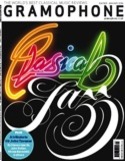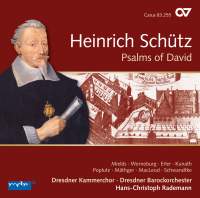Texte paru dans: / Appeared in:
*

GRAMOPHONE (01 /2014)
Pour s'abonner /
Subscription information
Carus
CAR83255

Code-barres / Barcode : 4009350832558
Reviewer: Fabrice Fitch
The Psalmen Davids of 1619 marked Schütz’s first foray into the realm of sacred music. In its monumentality and its textual content, it bookends his final work, the Schwanengesang, composed more than 50 years later. It’s possible that in the intervening years Schütz achieved a still greater degree of acuity in his text-setting than is found in some of these early pieces but the variety of forces and approaches to polychoral writing on display is infinitely absorbing.
Hans-Christoph Rademann continues his complete recorded edition of the composer’s works for Carus; here he opts for a choral approach whereby the choir of soloists (the ‘favoriti’) is offset by a larger vocal body. This sets the new recording apart from that of Cantus Cölln for Harmonia Mundi, now nearly 20 years old but with nary a wrinkle, in which no more than one singer is assigned per part. Listening to the two alongside each other is a fascinating experience. The pitch-level chosen by Rademann is about a semitone lower than that of Junghänel, who sometimes assigns a cornetto to the top lines (rather than a soprano) as a result.
As it is, the Dresdner Kammerchor’s sopranos very occasionally betray a slight strain at the top end, but otherwise the choir’s tone is pleasing and compact, softer-centred than their rivals. Rademann’s cast of soloists is perhaps the set’s greatest strength, matching Junghänel’s singers and even surpassing them on occasion for rhythmic subtlety (try the beginning of Ich hebe meine Augen auf). It’s possible to prefer Junghänel’s account in the round, on two interrelated counts: although the contrast between ripieno and soloists is lessened by his choice to use only soloists, the groups are thereby marginally better matched technically (as in Alleluja, lobet den Herren); another result of this choice is the greater prominence of the instrumental ensemble, whose members often take vocal lines on their own. This makes the most of the music’s sonic potential in the most richly scored pieces (Zion spricht, for example). That said, Rademann offers a strongly characterised alternative – no mean achievement, and undoubtedly worth experiencing.
Cliquez l'un ou l'autre
bouton pour découvrir bien d'autres critiques de CD
Click either button for many other reviews


